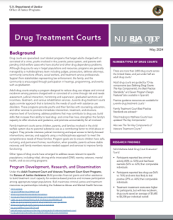Sex Offenders in the Community: Post-Release, Registration, Notification and Residency Restrictions
The management of sexual offenders in the community post-release is an issue of increasing concern to law enforcement, policymakers and the public. In recent years, efforts to strengthen registration and notification have been enhanced. At the same time, comparatively little attention has been paid to related matters, such as how residency restrictions may impact offenders' efforts to find stable work and living arrangements once they are released from prison, whether rates of recidivism have changed, and whether these policies increase the safety of potential victims.


